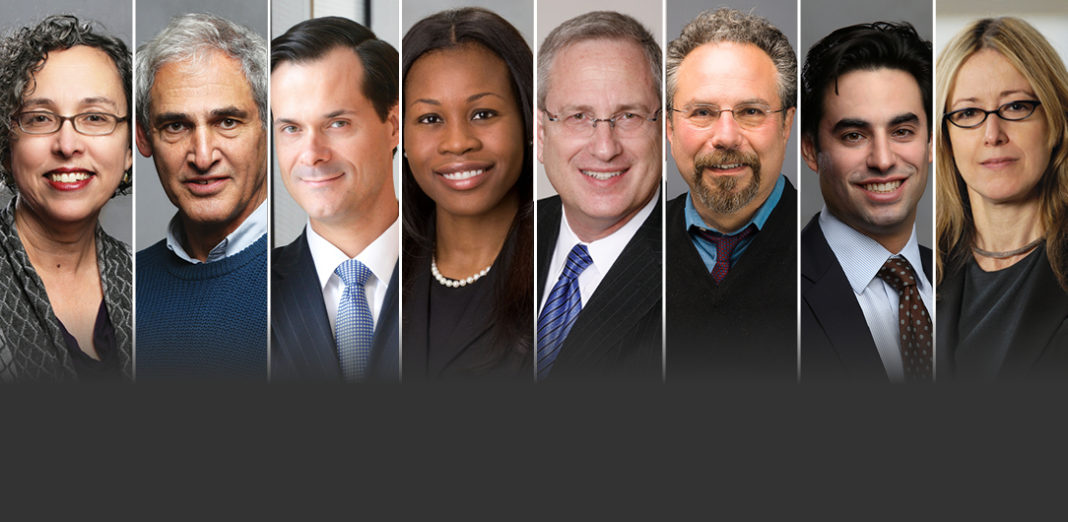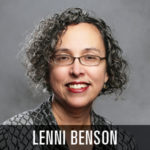Immigration Court Challenges
“Efforts to remove foreign nationals have increased exponentially, but resources for immigration court have not kept pace. While enforcement officers receive more funding to place more individuals in immigration court proceedings, the immigration courts are expected to handle larger caseloads without an adequate increase in resources. … Immigration adjudication takes time because immigration law is intensely complex, often involves claims that someone will face death or other persecution if sent away, and involves respondents who do not speak English.”
–“Fair Process in Name Only” by Lenni Benson in Notice & Comment, a blog from the Yale Journal on Regulation and the American Bar Association Section of Administrative Law and Regulatory Practice (co-authored by Jill Family)
Sports and Punishment
 “Collective responsibility and collective punishment has long been controversial. Under the Geneva Conventions, it’s a war crime. Opponents claim that a collective can never cause harm and thus should never bear moral responsibility. … But we routinely credit and praise a group, proponents of collective guilt counter, separate from the individuals who compose it: The Philadelphia Eagles won the Super Bowl; the Patriots won several. If we can credit and celebrate one collective, why can’t we blame and punish another? … When it banned Russia this past December, the [International Olympic Committee] initially imposed collective punishment on every Russian athlete, clean and dirty, whether or not they actively participated in the doping scheme or even passively tolerated it.”
“Collective responsibility and collective punishment has long been controversial. Under the Geneva Conventions, it’s a war crime. Opponents claim that a collective can never cause harm and thus should never bear moral responsibility. … But we routinely credit and praise a group, proponents of collective guilt counter, separate from the individuals who compose it: The Philadelphia Eagles won the Super Bowl; the Patriots won several. If we can credit and celebrate one collective, why can’t we blame and punish another? … When it banned Russia this past December, the [International Olympic Committee] initially imposed collective punishment on every Russian athlete, clean and dirty, whether or not they actively participated in the doping scheme or even passively tolerated it.”
–“How the Russian Doping Scandal Caused a War Between World Sporting Authorities” by Robert Blecker in the Observer
Location and Experiential Learning
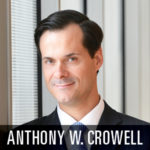 “The success of [NYLS’s] dramatic programmatic expansion was made possible not only because of NYLS’s location in New York City, but particularly because of its location as the only law school in lower Manhattan. Because of this location, NYLS has been able to bring about a systemic integration of classroom teaching with the abundance of practical opportunities just steps away at key administrative agencies, legal services offices, prosecutors’ offices, law firms, the courts, investment banks, tech start-ups, and a wide range of nonprofits—effectively creating a legal training campus like none other. … There are countless examples of how students are benefiting from, and having a positive community impact in every sector through their various placements. One 2L student, an Army veteran himself, assists other veterans at Legal Services NYC. Another 2L is an advocate for children with autism and other disabilities at the law firm Mayerson & Associates. A third has researched food deserts and educated middle school students about their rights under the Constitution. … ”
“The success of [NYLS’s] dramatic programmatic expansion was made possible not only because of NYLS’s location in New York City, but particularly because of its location as the only law school in lower Manhattan. Because of this location, NYLS has been able to bring about a systemic integration of classroom teaching with the abundance of practical opportunities just steps away at key administrative agencies, legal services offices, prosecutors’ offices, law firms, the courts, investment banks, tech start-ups, and a wide range of nonprofits—effectively creating a legal training campus like none other. … There are countless examples of how students are benefiting from, and having a positive community impact in every sector through their various placements. One 2L student, an Army veteran himself, assists other veterans at Legal Services NYC. Another 2L is an advocate for children with autism and other disabilities at the law firm Mayerson & Associates. A third has researched food deserts and educated middle school students about their rights under the Constitution. … ”
–Chapter, “Genius Loci: How Place Can Guide Strategic Planning That Enhances Student Engagement” by Anthony W. Crowell in Experiential Education in the Law School Curriculum (Carolina Academic Press, 2018)
Privacy and the Internet of Things
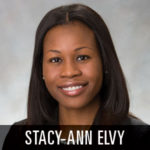 “The precipitous growth of the [Internet of Things] and the frequently reported data leaks suffered by large companies will likely contribute to an environment in which consumer demands for privacy and data security rise along with increases in the quantity and types of consumer data. This presents various opportunities for companies to monetize consumer privacy.”
“The precipitous growth of the [Internet of Things] and the frequently reported data leaks suffered by large companies will likely contribute to an environment in which consumer demands for privacy and data security rise along with increases in the quantity and types of consumer data. This presents various opportunities for companies to monetize consumer privacy.”
–“Paying for Privacy and the Personal Data Economy” by Stacy-Ann Elvy in the Columbia Law Review
The Future of Retail Shopping
 “Much has been written lately about the ‘death’ of malls and large-scale shopping centers. The data show, however, that the great numbers of these malls and centers are not going extinct but rather are undergoing an evolution from the fortress-type, retail-focused mall of the 1970s to a twenty-first century model better attuned to current tastes of citizens and consumers. There are indeed significant challenges, including purchasing trends, troubled brick and mortar retail, increased online sales, and living choices. But despite some shock-value headlines, the data show that the number of malls and large centers continues to increase. Moreover, owners are reconceptualizing the mall and large centers to better position them for economic challenges. New manifestations include the mall as an ‘experience’ beyond retail, lifestyle centers, and mixed-use, town center types of shopping centers.”
“Much has been written lately about the ‘death’ of malls and large-scale shopping centers. The data show, however, that the great numbers of these malls and centers are not going extinct but rather are undergoing an evolution from the fortress-type, retail-focused mall of the 1970s to a twenty-first century model better attuned to current tastes of citizens and consumers. There are indeed significant challenges, including purchasing trends, troubled brick and mortar retail, increased online sales, and living choices. But despite some shock-value headlines, the data show that the number of malls and large centers continues to increase. Moreover, owners are reconceptualizing the mall and large centers to better position them for economic challenges. New manifestations include the mall as an ‘experience’ beyond retail, lifestyle centers, and mixed-use, town center types of shopping centers.”
–“Land Use Regulation as a Framework to Create Public Space for Speech and Expression in the Evolving and Reconceptualized Shopping Mall of the Twenty-First Century” by Gerald Korngold in the Case Western Law Review
The Right to Counsel in Eviction Cases
 “On July 20, 2017, forty-eight years to the day after Neil Armstrong and Buzz Aldrin took the first human steps on the moon, the New York City Council passed Intro 214-B. The bill, signed into law by New York City Mayor Bill de Blasio on August 11, 2017, adds a new chapter to Title 26 of the Administrative Code of the City of New York that makes New York City the first jurisdiction in the United States to commit to providing legal representation to all low-income tenants who face eviction. … By guaranteeing legal representation for people who cannot afford counsel and whose homes are at stake in legal proceedings, Chapter 13 breaks new ground and marks a major step forward for the civil right to counsel movement. … Implementing the new law will be a major undertaking that will involve years of build-up, an enormous commitment of resources and a huge shift of expectations and culture. When fully implemented in 2022, the City of New York projects that it will be spending $155 million a year in provision of counsel for tenants facing eviction in New York City.”
“On July 20, 2017, forty-eight years to the day after Neil Armstrong and Buzz Aldrin took the first human steps on the moon, the New York City Council passed Intro 214-B. The bill, signed into law by New York City Mayor Bill de Blasio on August 11, 2017, adds a new chapter to Title 26 of the Administrative Code of the City of New York that makes New York City the first jurisdiction in the United States to commit to providing legal representation to all low-income tenants who face eviction. … By guaranteeing legal representation for people who cannot afford counsel and whose homes are at stake in legal proceedings, Chapter 13 breaks new ground and marks a major step forward for the civil right to counsel movement. … Implementing the new law will be a major undertaking that will involve years of build-up, an enormous commitment of resources and a huge shift of expectations and culture. When fully implemented in 2022, the City of New York projects that it will be spending $155 million a year in provision of counsel for tenants facing eviction in New York City.”
–“New York City’s ‘Universal Access’ Legislation: One Giant Leap for the Civil Right to Counsel” by Andrew Scherer in the MIE (Management Information Exchange) Journal
CRISPR and Public Health
 “Patent issues surrounding CRISPR, the revolutionary genetic editing technology, may have important implications for the public health. Patents maintain high prices for novel therapies, limiting patient access. Relatedly, insurance coverage for expensive therapies is waning. Patents also misallocate research and development resources to profitable disease indications rather than those that necessarily impinge on the public health. And it is unclear how CRISPR therapies will figure into the current regulatory framework. … Policy makers and physicians should consider these issues now, before CRISPR therapies become widely adopted—and entrenched—in the marketplace.”
“Patent issues surrounding CRISPR, the revolutionary genetic editing technology, may have important implications for the public health. Patents maintain high prices for novel therapies, limiting patient access. Relatedly, insurance coverage for expensive therapies is waning. Patents also misallocate research and development resources to profitable disease indications rather than those that necessarily impinge on the public health. And it is unclear how CRISPR therapies will figure into the current regulatory framework. … Policy makers and physicians should consider these issues now, before CRISPR therapies become widely adopted—and entrenched—in the marketplace.”
–“CRISPR, Patents, and Public Health” by Jacob S. Sherkow in the Yale Journal of Biology and Medicine
Transitional Justice in Argentina
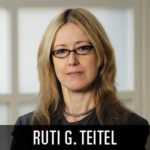 “It is crucially important to recognise that the transitional justice question arose somewhat differently in Argentina as compared to other countries. For the [Raúl Ricardo] Alfonsín administration, which had campaigned, and was elected, on the promise of accountability, the problem of justice was never presented as a matter of choice, as it would later be, for example, in Chile, Uruguay or South Africa (‘amnesty versus justice’). … A crucial dimension of the problem of accountability for past human rights violations committed under military rule in Argentina was deciding on the right community of judgement. This was a normative question with jurisdictional ramifications: Should the question of punishment, for example, be a matter of military or civilian justice? And what should be the criteria for adjudicating responsibility for human rights violations during the transition? … Who should be held responsible for the gross human rights abuses under military rule? The question of how to delineate the scope of responsibility for past atrocities committed during the period of Junta rule would come to present extraordinary tensions for the Alfonsín government and would be the subject of heated debate both in Argentina and in the US.”
“It is crucially important to recognise that the transitional justice question arose somewhat differently in Argentina as compared to other countries. For the [Raúl Ricardo] Alfonsín administration, which had campaigned, and was elected, on the promise of accountability, the problem of justice was never presented as a matter of choice, as it would later be, for example, in Chile, Uruguay or South Africa (‘amnesty versus justice’). … A crucial dimension of the problem of accountability for past human rights violations committed under military rule in Argentina was deciding on the right community of judgement. This was a normative question with jurisdictional ramifications: Should the question of punishment, for example, be a matter of military or civilian justice? And what should be the criteria for adjudicating responsibility for human rights violations during the transition? … Who should be held responsible for the gross human rights abuses under military rule? The question of how to delineate the scope of responsibility for past atrocities committed during the period of Junta rule would come to present extraordinary tensions for the Alfonsín government and would be the subject of heated debate both in Argentina and in the US.”
– “The Global Jurist as Pedagogue? Ronald Dworkin in Post-Junta Argentina” by Ruti G. Teitel in the London Review of International Law


